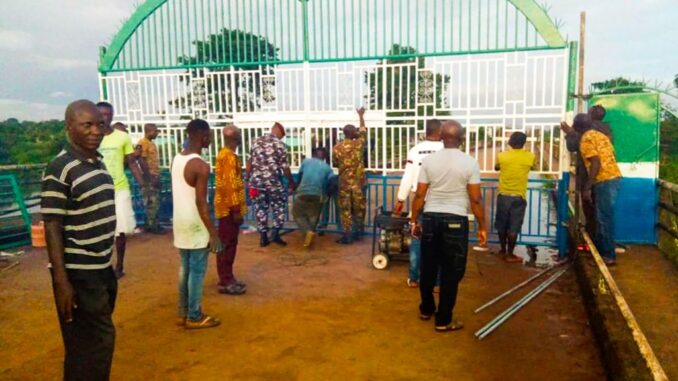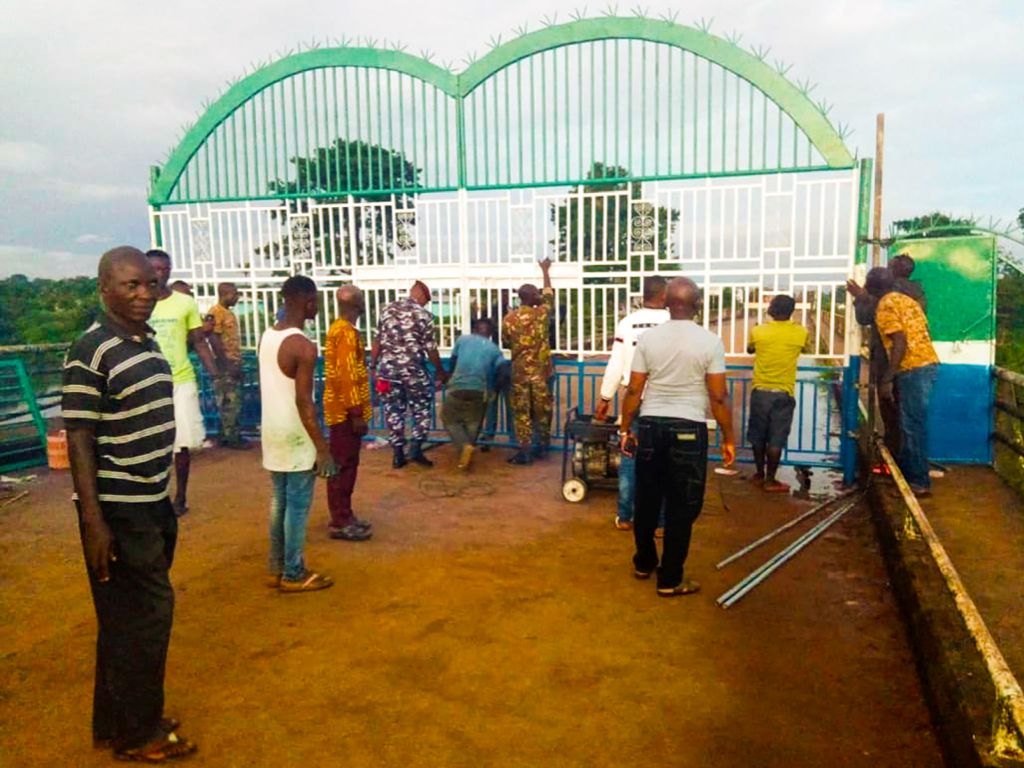
PROTECTING OUR LAND BORDERS – A PRIORITY FOR PARLIAMENT
1. INTRODUCTION
The ECOWAS Supplementary Act 2013 was ratified by the Heads of States of the 15member countries of the Regional Economic Community (REC) in July 2013. The Act makes provision for the establishment of Joint Border Posts (JBPs) and Common Control Zones on community land with appropriate infrastructure that will serve as the main point of entry and exit for all passenger and goods traffic movement across the border of adjoining member states. JBPs consist of specially designed buildings and circulatory roads to enhance the safe and expeditious flow of passenger and goods traffic as well the efficient use and application of Information and communication (ICT) for processing their movement across borders.

SIERRA LEONE’S BORDER WITH LIBERIA
Pursuant to the recognition that full regional integration would be a mirage without the removal of trade barriers, ECOWAS is intensifying efforts at creating joint border posts for seamless checks. The effort is in aid of the protocol of free movement of persons, goods and services in the region.
The joint border posts also have the advantage of serving as a platform for the implementation of measures aimed at simplifying customs procedures while increasing cooperation and coordination of border controls. ECOWAS citizens can hope to smile in the days ahead because of the expected rise in trade facilitation through the combination of joint and simultaneous clearance activities in one place. This ultimately leads to the achievement of economies of scale, including reducing the transit time of people, goods and services as well as transportation and transaction costs.
2. THE NEED FOR SECURING OUR LAND BORDERS
The Security Council resolutions 2000 (2011), 2062 (2012) and 2066 (2012) encourage ECOWAS and the MRU to develop, with the support of UNITED NATIONS OFFICE FOR WEST AFRICA AND THE SAHEL (UNOWAS), a sub-regional strategy to address the threat of cross-border movements of armed groups and weapons as well as illicit trafficking, with the assistance of UNOCI (United Nations Operations in Cote d’Ivoire), UNMIL (United Nations Missions in Liberia), UNIPSIL(United Nations Integrated Peacebuilding Mission in Sierra Leone) and the UNCT (United Nations Country Team) in Guinea.
The lack of a solid border and border security apparatus allows for cross-border illicit actions, such as the drug and arms trade, and human trafficking. According to Polaris, there are approximately 40.3 million victims of human trafficking, and in some parts of West Africa, almost 100% of the victims are children. Human trafficking is a major source of revenue for Boko Haram. Moreover, the absence of a secure border allows terrorist organizations to cross legal and geographical boundaries with impunity, hindering any one nation from capturing or defeating Boko Haram fighters and perpetuating the suffering of the local populations. Therefore, for these nations to successfully defeat Boko Haram, they must mount a closely coordinated effort.
The main objectives for the establishment of joint border posts
• Protect national security and autonomy albeit through joint application of border controls by adjoining countries
• Expedite existing protocols on free movement of ECOWAS citizens and the efficient flow of goods traffic
• Enhance inter and intra-regional trade through transparency and standardization of operating procedures of the border agencies
• Promote and facilitate the economic activities of member states and their contribution to global trade and commerce
• Reduce time loss for transit traffic through efficient use and application of ICT
• Protect public health and reduce human trafficking • Stop illegal trading and the dumping of sub-standard goods
Joint Border Post Operation
• Cross-border agency cooperation is very complex and relies on a robust legal framework shared by both countries;
• Policy declaration – a memorandum of understanding or a bilateral agreement.
• The optimal form of cross-border cooperation is the Joint Border Post (JBP), operated by two neighbouring countries.
• The joint operation of border posts requires close cooperation in the daily management of the border posts
• Harmonization of requested documentation,
• Joint maintenance of the infrastructure,
• Joint or mutually recognised controls, and the exchange of data.
• The deployment of border agency officials and security agencies to prevent terrorism on the international boundary between Sierra Leone and her neighbours has to be regulated. Often
• The need for substantial infrastructure investments (new buildings, access roads, information and communications infrastructure)
3. THE ROLE OF PARLIAMENT: NECESSARY & TIMELY INTERVENTION
Protocols establishes a legal cooperation in order to promote long term cooperation between Members states on diverse issues relating to economic integration; trade facilitation; free movement of citizens; and cross border security. The onus is on our Parliamentarians to domesticate these laws in the interest of our citizens.
The Economic Community of West African States (ECOWAS) and the International Centre for Migration Policy Development (ICMPD) recently organized a webinar to discuss the impact of COVID-19 on one of ECOWAS’s main instruments for regional integration, the Free Movement Protocol. While the coronavirus represents a global emergency, countries around the world immediately closed their borders to protect their citizens and prevent the spread of the virus. This raises the issue of regional cooperation and possible roadmap for future response to similar emergencies.
Prior to the general elections in Guinea, the Guinean government decided to close its border with Sierra Leone. This move has not only affected trade between the two countries it also affects the movement of people between the two countries who share common family and cultural ties. Parliament should as a priority look into this matter that has a profound effect on our economy. This will eventually lead to talks between the two country to fully implement the ECOWAS Protocol on Joint Border Operations because of the following reasons:
• Poor coordination and discordant procedures between border Agencies
• Cumbersome Border Procedures
• Increasing number of agencies at border each with its own controls and own management
• Two national systems
• Loss of revenue to Governments
• Border-related costs may amount to 15% of the value of imported goods
Finally, the joint border posts between Sierra Leone and Guinea also have the advantage of serving as a platform for the implementation of measures aimed at simplifying customs procedures while increasing cooperation and coordination of border controls between the two countries.
Victor Ako Mengot
Consultant on ECOWAS Trade Facilitation & Joint Border Post Security & Management



